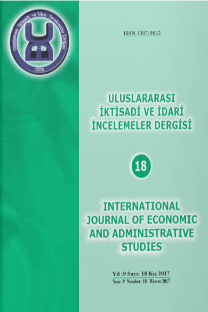PSİKOLOJİK SÖZLEŞME İHLALİNİN YENİLİKÇİ DAVRANIŞA ETKİSİ: ÖRGÜTSEL SESSİZLİĞİN ROLÜ: SAVUNMA SANYİİNDE BİR UYGULAMA
Psikolojik Sözleşme İhlali, Yenilikçi Davranış, Örgütsel Sessizlik
THE EFFECT OF PSYCHOLOGİCAL CONTRACT BREACH ON INNOVATIVE WORK BEHAVIOR: THE ROLE OF ORGANIZATIONAL SILENCE: AN APPLICATION FOR DEFENSE INDUSTRY
___
- Argyris, C. ve Schön, D. (1978). Organizational learning: A theory of action perspective. Reading MA: Addison-Wesley.
- Bal, P. M., De Lange, A. H., Jansen, P. G. ve Van Der Veld, M. E. (2008). Psychological contract breach and job attitudes: A meta- analysis of age as a moderator. Journal of Vocational Behavior, 72, 143–158.
- Banbury, C. ve Mitchell, W. (1995). The Effect of Introducing Important Incremental Innovations on Market Share and Business Survival. Strategic Management Journal, 16, 161-182.
- Blau, P. (1964). Exchange and power in social life. New York: Wiley.
- Chang, H., Hsu, H., Liou, J. ve Tsai, C. (2013). Psychological contracts and innovative behavior: A moderated path analysis of work engagement and job resources. Journal of Applied Social Psychology, 43, 2120–2135.
- Çakıcı, A. (2010). Örgütlerde İşgören Sessizliği: Neden Sessiz Kalmayı Tercih Ediyoruz? Ankara: Detay Yayıncılık.
- Fuller, J., Marler, L. ve Hester, K. (2006). Promoting Felt Responsibility for Constructive Change and Proactive Behavior: Exploring Aspects of an Elaborate Model of Work Design. Journal of Organizational Behavior, 27(8), 1089-1120.
- Hamel, G. (2000). Waking up IBM. Harvard Business Review, 78(4), 137-146.
- Hanif, F. ve Khan, M. (2016). Linking Psychological Contract and Innovative Work Behavior, moderated path analysis of Organizational Resources and mediated role of Work Engagement. Proceedings of 2nd International Multi-Disciplinary Conference, (s. 1-11). Gujrat.
- Hayes, A. (2013). An introduction to mediation, moderation, and conditional process analysis: A regression-based approach. New York: Guilford.
- Hayes, A. F. ve Matthes, J. (2009). Computational procedures for probing interactions in OLS and logistic regression: SPSS and SAS implementations. Behavior Research Methods, 41, 924–936.
- Henriksen, K. ve Dayton, E. (2006). Organizational silence and hidden threats to patient safety. He-alth Services Research, 41, 1539–1554.
- Hirschman, A. O. (1970). Exit, Voice, and Loyalty: Responses to Decline in Firms, Organizations, and States. Cambridge: MA: Harvard University Press.
- Janssen, O. (2000). Job Demands, Perceptions of Effort-Reward Fairness and Innovative Work Behaviour. Journal of Occuptional and Organizational Psychology, 73(3), 287-302.
- Jong, J. P. (2007). Individual innovation: The connection between leadership and employees’ innovative work behavior. Amsterdam: Zoetermeer: EIM.
- Kahn, W. A. (1990). Psychological conditions of personal engagement and disengagement at work. Academy of Management Journal, 33, 692–724.
- Katz, D. (1964). The Motivational Basis of Organizational Behavior. Behavioral Science, 9(2), 131-146.
- Lu, J. ve Xie, X. (2013). Research on Employee Silence Behavior: A Review Based on Chinese Family Enterprise. Asian Social Science, 9(17).
- Milliken, F., Morrison, E. ve Hewlin, P. (2003). An exploratory study of employee silence : Issues that Employees Don't Communicate Upward and why? Journal of management studies, 40(6), 1453-1476.
- Morrison, E. ve Milliken, F. (2000). Organizational Silence: A Barrier to Change and Development in a Pluralistic World. Academy of Management Review, 25(4), 705-725.
- Morrison, E. ve Robinson, S. L. (1997). When employees feel betrayed: A model of how psychological contract violation develops. Academy of Management Review, 22, 226–256.
- Newton, S. K., Blanton, J. E. ve Will, R. (2008). Innovative Work and Citizenship Behaviors from Information Technology Professionals: Effects of Their Psychological Contract. Information Resources Management Journal, 21(4), 27-48.
- Roberts, P. (1999). Product Innovation, Product-Market Competition and Persistent Profitability in the U.S. Pharmaceutical Industry. Strategic Management Journal, 20, 655-670.
- Robinson, S. L. ve Morrison, E. W. (1995). Psychological contracts and OCB: The effect of unfulfilled obligations on civic virtue behavior. Journal of Organizational Behavior, 16(3), 289-298.
- Robinson, S. L. ve Morrison, E. W. (2000). The development of psychological contract breach and violation: A longitudinal study. Journal of Organizational Behavior, 21, 525-546.
- Robinson, S. L. ve Rousseau, D. M. (1994). Violating the psychological contract: Not the exception but the norm. Journal of Organizational Behavior, 15(3), 245-259.
- Rousseau, D. M. (1989). Psychological and implied contracts in organizations. Employee Responsibilities and Rights Journal, 2, 121–139.
- Sharma, P. ve Chrisman, J. (1999). Toward a Reconciliation of the Definitional Issues in the Field of Corporate Entrepreneurship. Entrepreneurship Theory and Practice, 23(3), 11-27.
- Sobel, M. (1982). Asymptotic confidence intervals for indirect effects in structural equation models. Sociological Methodology, 13, 290–312.
- Tekleab, A., Takeuchi, R. ve Taylor, M. (2005). Extending the chain of relationships among organizational justice, social exchange, and employee reactions: the role of contract violations. Academy of Management Journal, 48(1), 146–157.
- Turnley, W. H. ve Feldman, D. C. (1998). Psychological contract violations during organizational restructuring. Human Resource Management, 37, 71-83.
- Wang, Y. D. ve Hsieh, H. H. (2014). Employees' reactions to psychological contract breach: A moderated mediation analysis. Journal of Vocational Behavior, 85, 57-66.
- Yuan, F. ve Woodman, R. (2010). Innovative Behavior in the Workplace: The Role of Performance and Image Outcome Expectations. Academy of Management Journal, 53(2), 323-342.
- ISSN: 1307-9832
- Yayın Aralığı: 4
- Başlangıç: 2008
- Yayıncı: Kenan ÇELİK
GİRİŞİMCİLİK FAALİYETLERİNDE MENTORLUK YÖNETİMİNİN YATIRIMIN GERÇEKLEŞMESİ ÜZERİNE ETKİLERİ
STK’LARDA STRATEJİLER VE TEMEL KRİTERLER: İZMİR İLİNDE BİR ARAŞTIRMA
Nezih Metin ÖZMUTAF, Ali KÖSTEPEN
STRATEJİK MALİYET YÖNETİMİ- BİST’E KOTE İMALAT İŞLETMESİ ÜZERİNE ARAŞTIRMA
Rabia Kübra TÜNEL, İlker GÜLENÇER
YALIN ÜRETİM UYGULAMALARI VE KAZANIMLARI
Emre Bilgin SARI, Emre BİLGİN SARI
